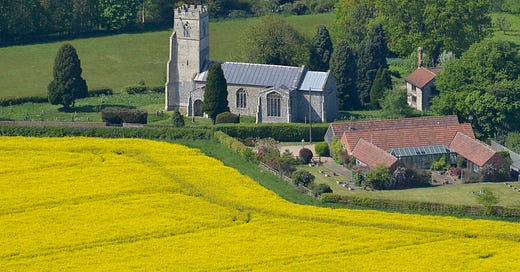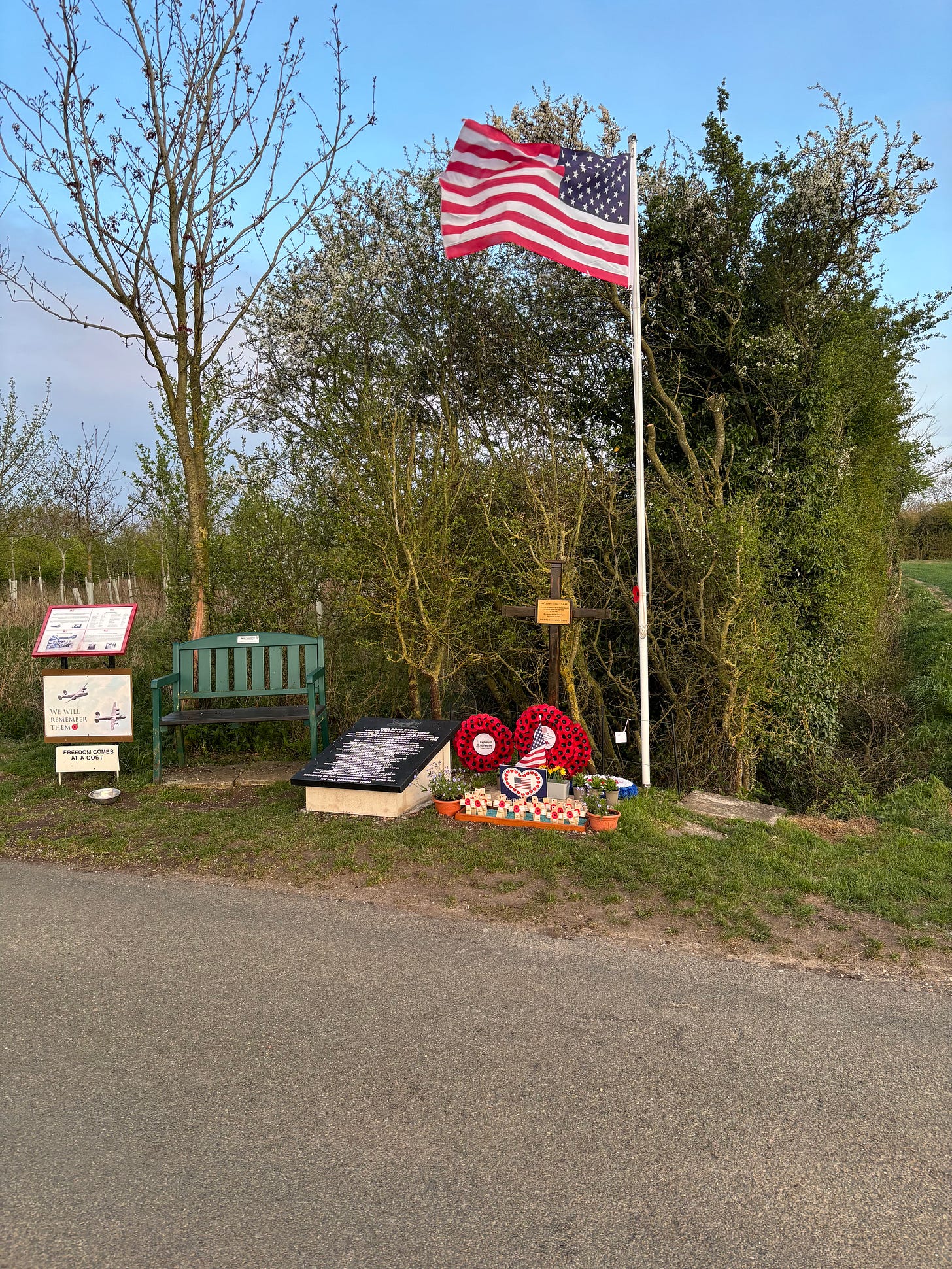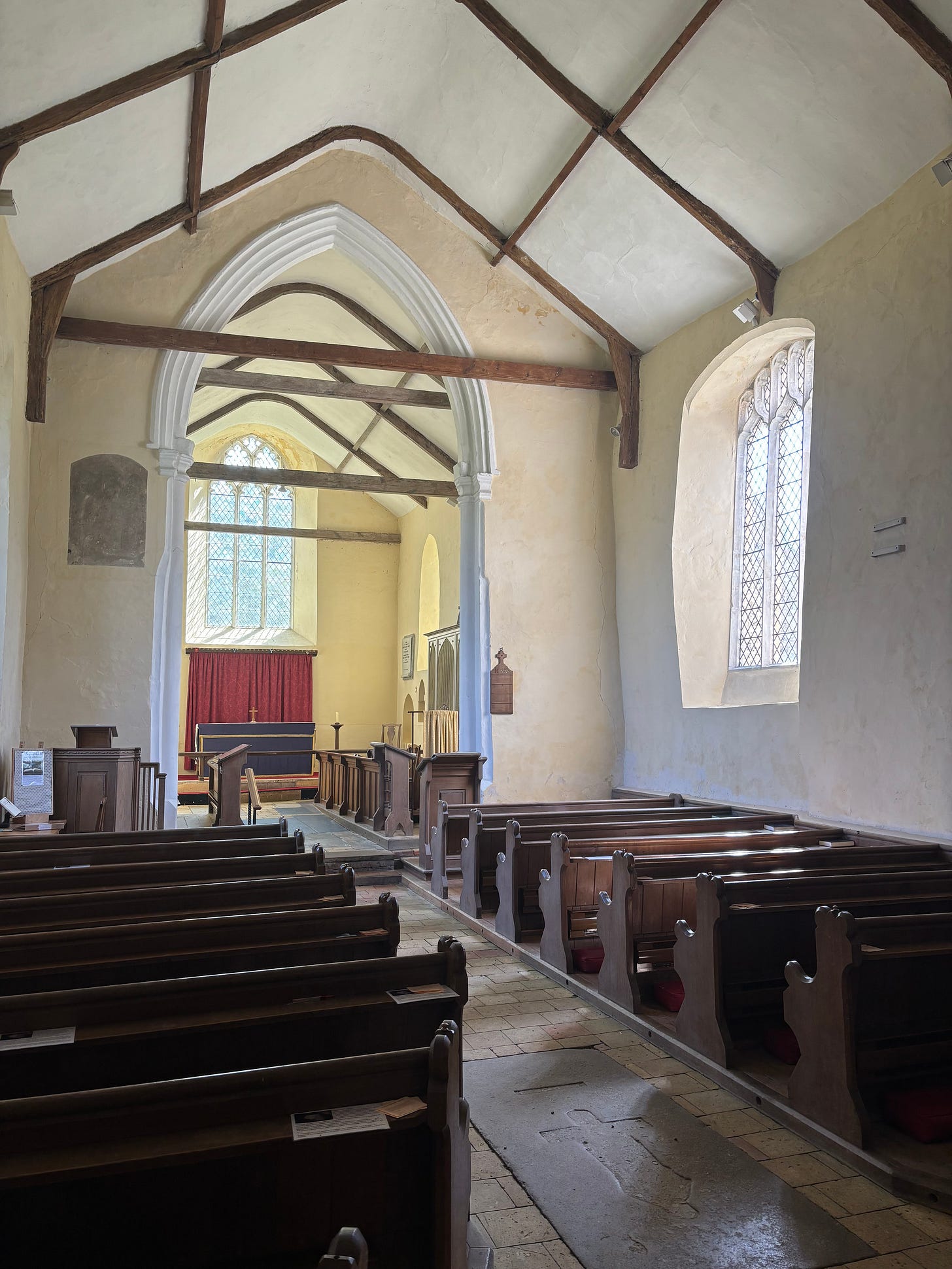Whan that Aprill with his shoures soote/The droghte of March hath perced to the roote,/And bathed every veyne in swich licour,/Of which vertu engendred is the flour....
An English Spring is matchless, the more so because it is so fleeting. I am in Norfolk, where we have a tiny 15th century house. I’m immersed in the glory of this ancient county—its sessile oaks, sweet grass, fields of yellow rapeseed, fat sheep, medieval flint churches, generational graveyards.
Today I am driving from our village, Harleston, to the ruins of Venta Icenorum, a Roman town founded near the River Tas in about 60 AD. The town was constructed on top of neolithic settlements perhaps 2,000 years old at the time. Gradually abandoned after the 8th century, this is one of the few Roman ruins not built over by those who came later.
The earth of Norfolk is deep with human history, much of it long forgotten. Max Sebald, the German writer who settled here as a professor at the University of East Anglia and is buried in nearby Framingham Earl, mined these lost memories in his great book The Rings of Saturn. Of the 17th century English physician Thomas Browne, he wrote
To him it seems a miracle that we should last so much as a single day. There is no antidote, he writes, against the opium of time….Not even those who have found a place amidst the heavenly constellations have perpetuated their names: Nimrod is lost in Orion, and Osiris in the Dog Star. Indeed, old families last not three oaks. To set one’s name to a work gives no-one a title to be remembered, for who knows how many of the best men have gone without a trace?
Manhandling my car through viciously tight country lanes, I am listening to Ian Toll's Pacific Crucible and his account of the Battle of Midway on June 4th, 1942. The doomed flight of Torpedo Squadron 8 is underway: all fifteen of the obsolete Douglas Devastators led by Commander John Waldron will be shot down, leaving one survivor, Ensign George Gay, afloat in the ocean to witness the destruction of four Japanese aircraft carriers. And I am wondering if the names of these two men can still be found on the US Department of Defense's website: Waldron was part Oglala Lakota, after all, and references to the Hiroshima bomber, Enola Gay, have apparently been expunged as part of Secretary Pete Kegseth's anti-DEI crusade.
The citizens of Norfolk still honor the Americans who gave their lives here. The annual veterans' pilgrimages may have ceased now that the last of the World War Two veterans are dead—but yesterday I came upon a roadside memorial dedicated only last week, on the eightieth anniversary of the deaths of 22 USAAF aircrew killed in a mid-air collision over Jay's Green outside Harleston.
Like everyone, they will in time be forgotten—but not yet, not here. Many of us believe that part of who we are, and much of what we value, we owe to the Americans of my father’s generation. Harleston is only four miles from Thorpe Abbotts, home of the "Bloody Hundredth", the 100th Bomb Group commemorated in Steven Spielberg’s recent Masters of the Air mini-series. Between 1942 and 1945 this airbase was home to four squadrons of Flying Fortresses (Boeing B-17s), a triangle of three vast concrete runways and 3,500 service personnel: the largest city for miles around. Today, although the runways have reverted to wheat and the last traces of broken buildings are covered by brambles and secondary woodland, a control tower and a couple of Nissen huts still serve as a small museum. Thorpe Abbotts was one of 17 such USAAF bomber bases in Norfolk. Over 26,000 Americans died flying from East Anglia; the Cambridge American Cemetery holds the remains of many of them, and some 5,000 names are inscribed on the Walls of the Missing.
I leave the car to walk round the ramparts of the Roman city, then carry on up through beech woods, along public footpaths that preserve ancient rights of way across private land; here you can walk right through the middle of early barley and beet fields. There are pheasants, hares, larks, the odd horse, and in the clean distance, the spire of Norwich Cathedral.
A couple of hours later, I am back at Venta Icenorum. Near the car park, the church of St. Edmund of Stoke Holy Cross, built over 900 years ago and rebuilt several times since. Its walls contain Roman bricks; the chancel is 13th century, the nave Perpendicular (14th-15th century); it stands as a quiet memorial to whole bloodlines of forgotten worshippers.
The church is open for Good Friday, and I go inside. It’s empty, sparse, light from a blue sky streaming in through large clear windows. I sit in a pew and think about my family, both the living and the dead.
But I find my concentration slipping. Perhaps it’s all these reminders of the Second War; perhaps it’s just the incessant turmoil we have all been subjected to in recent weeks. I am once again replaying that infamous White House meeting from the end of February. When the president of Ukraine, a country fighting fascism on behalf of democratic Europe and America, came to pay his respects—and was taunted by a chorus of dementors, cynics all, exemplars of the very ideology that Norfolk's dead Americans gave their lives to repel 1/.
On a bench in front of me lies a large bible bound in black leather, a gift from a parishioner. As I sometimes do, I open it at random to see if it has anything to say to me. The first time, not. I try again. And this is what I find: Isiah 28, verses 16-19.
"16 So this is what the Sovereign Lord says:
See, I lay a stone in Zion, a tested stone,
a precious cornerstone for a sure foundation;
the one who relies on it
will never be stricken with panic.
17 I will make justice the measuring line
and righteousness the plumb line;
hail will sweep away your refuge, the lie,
and water will overflow your hiding place.
18 Your covenant with death will be annulled;
your agreement with the realm of the dead will not stand.
When the overwhelming scourge sweeps by,
you will be beaten down by it.
19 As often as it comes it will carry you away;
morning after morning, by day and by night,
it will sweep through.”
Footnotes
1/ In the world of Harry Potter, dementors are wraithlike creatures that feed on human happiness, generating feelings of despair. They have the ability to consume a person's soul, leaving them in a permanent vegetative state. See https://www.harrypotter.com/fact-file/creatures/dementor.
Photo Credits
St. Lawrence in Hunworth, Norfolk - John Fielding on Flickr, May 20, 2015
Bibliography
Geoffrey Chaucer, c. 1400, Prologue to The Canterbury Tales, Lines 1-4.
Max Sebald, 1998, The Rings of Saturn, London, The Harvill Press Ltd. (originally Die Ringe des Saturn, Ein englische Walfahrt).
Ian W. Toll, 2012, Pacific Crucible—War at Sea in the Pacific, 1941-1942, New York, W. W. Norton and Company.







Thank you for this beautiful piece again.
I remember vividly my visit to the American cemetery at Normandy, not far from the D-Day beaches. As I wandered among the endless rows of white markers, I noticed a pair of young children darting between the graves, playing tag. At first, their laughter felt jarring—disrespectful, even. But then it struck me: this was the very legacy of the sacrifice buried beneath their feet. The freedom to play without fear, to live unburdened—that was the inheritance granted by the young men who now rested there.
Inside the museum that day, I came across a recording of a D-Day veteran—an elderly man in his nineties, his voice trembling with age and memory. He spoke of the beach, of the chaos, of the slaughtered waves of Americans mowed down by German fire. I can no longer recall his exact words, but the weight of them has stayed with me ever since. Your piece brought that memory back with startling clarity.
Now, as the last of those veterans pass into silence, I find one of my darker theories about the human condition stirring uncomfortably in my mind. It has been too long since the world has known true war. Real war—bloody, brutal, unsanitized. We live in an age of ease, swaddled in convenience, where conflict is often romanticized by those who have never felt its heat. I fear that this detachment from the visceral horror of war is not peace—but prelude. The closer we drift toward forgetting, the nearer we come to repeating.